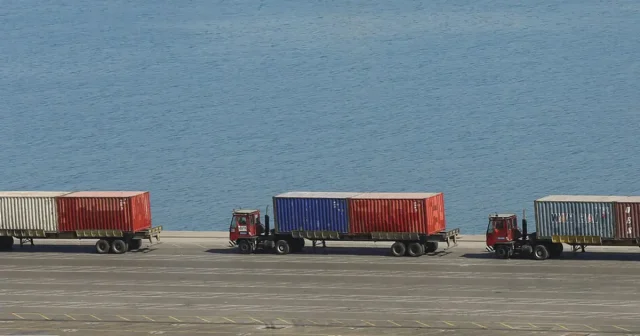While Iran’s efforts to become a regional transit hub over the last two decades have failed, talks are reportedly underway with 21 countries to launch free economic zones aimed at boosting the sector.
Presidential advisor Hojjat Abdolmaleki, who also serves as the secretary of the Supreme Council of Free Zones in Iran, claimed that the Islamic Republic has signed memoranda of understanding (MoUs) with six countries in this field. Although he did not specify the names, he mentioned that the Taliban is interested in investing in Iran’s Chabahar port, near Pakistan’s border.
His claim coincided with Iranian authorities seizing the first Afghanistan-Turkey rail freight transit through Iran since April 20, while officials made contradictory statements about the reasons behind the seizure.
The train, carrying 1,100 tons of talc minerals, traveled along the Khaf-Herat railway, which was inaugurated last summer in the presence of Taliban and Iranian officials. It arrived at Iran’s Rozanak station on the border with Afghanistan on April 20 but was halted there for reasons that remain unclear.
Following this, Iran made a peculiar move by detaching the locomotive and relocating it to an undisclosed site.
While officials have yet to provide clarification on this matter, the Minister of Roads and Urban Development, Mehrdad Bazrpash, signed multiple Memoranda of Understanding (MoUs) with the UAE on May 2, encompassing the transportation sector. This occurred during the inaugural meeting of the Joint Economic Committee, marking its first convening in a decade following tensions between Iran and certain Arab states.
The Arab states, including Saudi Arabia, Kuwait, and the UAE, resumed diplomatic relations with Iran in 2022 following their ceasefire agreement with Iran-backed Houthi rebels in Yemen.
Iran’s transit plans
Iran has signed multiple unsuccessful deals with foreign countries over the last two decades in an attempt to become a regional transit hub, encompassing cargo, oil, gas, and electricity agreements.
One such agreement is the North-South Corridor, intended to facilitate the transit of cargoes from India to Afghanistan, Central Asia, and Russia, but it has yet to materialize.
India also signed an agreement to develop Iran’s Chabahar port as a part of the North-South corridor in early 2010s.
India partially initiated the Chabahar project and has been overseeing it since 2019. Though, apart from a few humanitarian shipments to Afghanistan, it has not yet facilitated the transit of any goods through Iran to foreign countries. This is largely due to Iran’s failure to complete the 630-km Chabahar-Zahedan railway over the past two decades.
Iran has also failed to complete the 162-kilometer Rasht-Astara railway, which is intended to link with the rail networks of the Republic of Azerbaijan and Russia.
Tehran is additionally burdened by US sanctions and enduring tensions with both regional and Western states. Consequently, Iran managed to transit only 1.5 million tons of foreign cargo via its rail network last year, primarily consisting of Turkmen sulfur.
This volume represents a mere 20% of the international rail freight passing through the Republic of Azerbaijan, for example.
China has also omitted Iran from the $1-trillion “Belt and Road Initiative” project, opting instead to transit its goods to the West via the route through Central Asia, Azerbaijan, Georgia, and Turkey.
India has also excluded Iran from its transit routes priorities by signing MoUs with UAE and Saudi Arabia in 2023 to launch the India–Middle East–Europe corridor.
In terms of the logistics performance index (LPI), the World Bank has ranked Iran among the poorest countries. Last year, the Islamic Republic ranked 123 of the 139 countries compared, marking the lowest score among all neighbors, except Afghanistan. Even Iraq outperformed Iran in terms of LPI, ranking 115 globally.
Iraq is preparing to launch a huge transit project from The Faw Grand Port to Turkey’s borders. The Faw Grand Port in southern Iraq, developed 80%, will be the largest port in the Persian Gulf. The port is being built by the South Korean company Daewoo on the Faw Peninsula, south of Basra, at a cost of about $5 billion and is projected to be completed in 2025.
Iraq plans to invest $17 billion to complete transit routes from the Faw Grand Port to Turkey. This initiative gained momentum when Iraq, Turkey, UAE, and Qatar signed a Memorandum of Understanding (MoU) to develop this project on April 22. Turkey itself ranks 11th globally in terms of logistics market value with $100 billion worth in 2023.





















